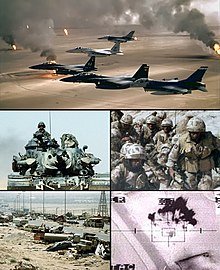On February 22, 1991, a significant event took place during the Gulf War. Iraq, under the leadership of Saddam Hussein, agreed to a ceasefire agreement proposed by the Soviet Union. This agreement marked a crucial turning point in the conflict, as it demonstrated Iraq’s willingness to comply with certain conditions in order to bring an end to the hostilities that had been initiated by its invasion of Kuwait.
The Gulf War, which began in August 1990, was a result of Iraq’s invasion of Kuwait. This act of aggression by Iraq was met with swift condemnation from the international community. The United Nations Security Council passed a series of resolutions demanding Iraq’s immediate withdrawal from Kuwait and imposing economic sanctions on the country.
As the war progressed, it became clear that a negotiated settlement was necessary to bring an end to the conflict. The Soviet Union, which had historically maintained close ties with Iraq, proposed a ceasefire agreement that outlined specific conditions for Iraq to meet in order to halt the fighting.
The ceasefire agreement put forth by the Soviet Union included several key provisions. First and foremost, Iraq was required to withdraw all of its forces from Kuwait, effectively ending the occupation. Additionally, Iraq was to release all prisoners of war and agree to a complete cessation of hostilities.
While Iraq agreed to these conditions, the Coalition forces, led by the United States, initially hesitated to accept the ceasefire agreement. The Coalition had made significant military advances and was poised to achieve a decisive victory over Iraq. There were concerns that accepting the ceasefire agreement would allow Iraq to escape the consequences of its actions and potentially regroup for future aggression.
However, diplomatic efforts continued, and the ceasefire agreement was ultimately accepted by the Coalition forces. On February 28, 1991, President George H.W. Bush announced that the Gulf War had come to an end. The ceasefire agreement had been successfully implemented, and Iraq had complied with the conditions outlined by the Soviet Union.
The significance of the ceasefire agreement cannot be overstated. It marked a crucial moment in the Gulf War, bringing an end to the intense military engagement that had characterized the conflict. It also demonstrated the effectiveness of diplomatic efforts in resolving international disputes.
In the years following the Gulf War, the ceasefire agreement continued to shape the relationship between Iraq and the international community. The conditions outlined in the agreement, such as the requirement for Iraq to disarm its weapons of mass destruction, became the basis for subsequent United Nations resolutions and inspections.
Despite the ceasefire agreement, tensions between Iraq and the international community remained high. Iraq’s failure to fully comply with the conditions of the agreement led to further conflicts and interventions in the region, culminating in the 2003 invasion of Iraq by a U.S.-led coalition.
In conclusion, the ceasefire agreement between Iraq and the Soviet Union in 1991 was a pivotal moment in the Gulf War. It signaled Iraq’s willingness to comply with certain conditions to end the conflict, although it took some time for the Coalition forces to accept the agreement. The ceasefire agreement had far-reaching implications for the relationship between Iraq and the international community, shaping subsequent resolutions and inspections. However, it also laid the groundwork for future conflicts in the region.

